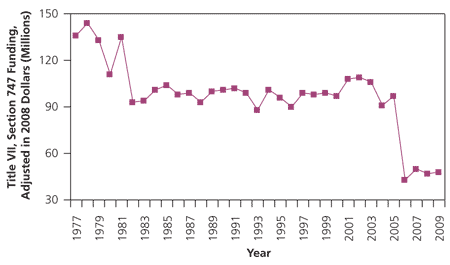
Am Fam Physician. 2009;80(8):872
Title VII, Section 747 is a source of federal funding intended to strengthen the primary care workforce. Despite evidence that Title VII has been successful, its funding has declined over the past three decades, threatening the production of primary care physicians.
Title VII, Section 747 of the Public Health Services Act is intended to increase the quality, quantity, and diversity of the primary care workforce, with special emphasis on increasing capacity to care for the underserved. It supports the development of innovative primary care curricula and programming at the medical school, residency, fellowship, and departmental levels.

Access to primary care is in jeopardy. The nation needs renewed or enhanced investment in programs, like Title VII, that support the production of primary care physicians and their placement in underserved areas.